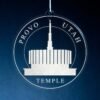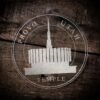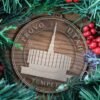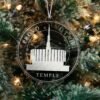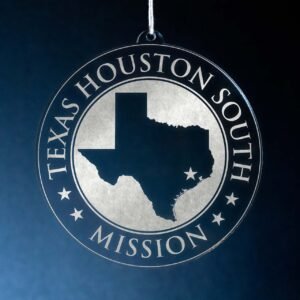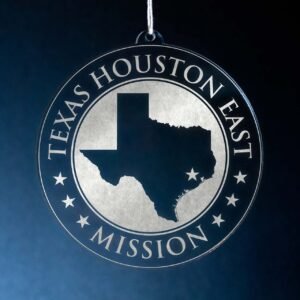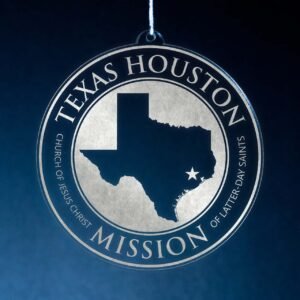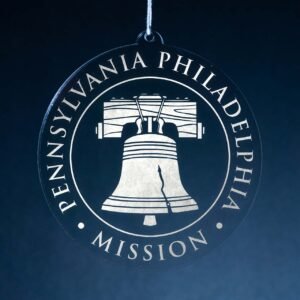Provo Utah Temple Christmas Ornament
$17.99 Original price was: $17.99.$13.99Current price is: $13.99.
Let this ornament bring your family close together around the tree to ponder the miracle of the Provo Utah Temple.
| Material | Transparent Acrylic |
| Construction | Laser Etching |
| Length | 4 Inches |
| Width | 3 7/8 Inches |
| Weight | 0.8 oz |
| Shipping | Usually ships within 1-2 days |
| Returns | Within 30 days of purchase |
Product Description
Made out of a lightweight and very durable transparent acrylic, this ornament will not weigh your tree down and can definitely withstand being dropped by the little ones should they get too curious around the tree. The acrylic is cut into a 4 inch circle and then laser etched with the name of the temple and a graphic depicting an artistic representation of the Provo Utah Temple.
Get one for your loved ones to remind them that families can be together forever!
Temple Information

Address
Provo, Utah 84604-1766
Dedicated
Size
Temple Reconstruction
In his concluding remarks at the Sunday Afternoon Session of the October 2021 General Conference, President Russell M. Nelson announced that the Provo Utah Temple would be close for reconstruction following the dedication of the Orem Utah Temple.
Temple Locale
Located on Provo's east bench near the mouth of magnificent Rock Canyon, the Provo Utah Temple claims a stunning backdrop of towering mountains. The extensive temple grounds are decorated with a cascading water feature and numerous flowers, shrubs, and trees. Across the street is the Missionary Training Center (MTC) where thousands of young missionaries reside year round preparing for missionary service around the world. The campus of Church-owned Brigham Young University (BYU) borders the temple to the southwest.
Temple History
The Provo Utah Temple was the sixth temple built in Utah and the first built in Utah County.
The Provo Utah Temple is one of only four temples with six instruction rooms. (The other three temples are the Ogden Utah Temple, the Jordan River Utah Temple, and the Washington D.C. Temple.)
The Provo Utah Temple and Provo City Center Temple were the second pair of temples to be built in the same city, following the Jordan River Utah Temple (1981) and Oquirrh Mountain Utah Temple (2009) in South Jordan, Utah.
The Provo Utah Temple was originally named the Provo Temple.
The announcement of the Provo Utah Temple and Ogden Utah Temple was prompted by a statistic computed in the mid-1960s that 52 percent of all ordinance work was performed in three temples: the Logan Utah Temple, the Manti Utah Temple, and the Salt Lake Temple.
The original design for the Provo Utah Temple included a gold-leafed statue of the angel Moroni atop a gold-colored spire. The statue was eventually eliminated from the design, though one was added over 31 years after its dedication as part of a renovation project in 2003 that also changed the spire color from gold to white.
The groundbreaking ceremony for the Provo Utah Temple was held just one week after the groundbreaking ceremony for the Ogden Utah Temple, marking the first time that two groundbreaking ceremonies were held in the same month. The two buildings were built at the same time and were nearly identical in appearance until the Ogden Utah Temple was given an architectural facelift in the early 2010s.
The Provo Utah Temple stands adjacent to Church-owned Brigham Young University. The Church's other two universities; Brigham Young University–Hawaii in Laie, Hawaii, and Brigham Young University–Idaho in Rexburg, Idaho; also have adjacent temples.
President Joseph Fielding Smith presided at the dedication of the Provo Utah Temple, but at his request, the prayer he had written was offered by President Harold B. Lee, first counselor in the First Presidency.
The Provo Utah Temple was dedicated in just two sessions by seating attendees—in addition to the temple—in the Marriott Center, George Albert Smith Fieldhouse, Joseph Smith Building, Harris Fine Arts Center, and Knight-Mangum Hall (Language Training Mission) on the BYU campus. Over 70,000 attended in what was the largest temple dedication in history.
In the late 1970s, a feasibility study was prepared by the Provo Temple presidency for the establishment of a Provo Temple Visitors Center. The study included statistical compilations of responses to a survey sent to stake presidents within the temple district. However, no visitors' center was ever established.
Related Products
Related products
-
Sale!

Texas Houston South Mission Christmas Ornament
$18.98Original price was: $18.98.$16.98Current price is: $16.98. Add to cart -
Sale!

Texas Houston East Mission Christmas Ornament
$18.98Original price was: $18.98.$16.98Current price is: $16.98. Add to cart -
Sale!

Texas Houston Mission Christmas Ornament
$18.98Original price was: $18.98.$16.98Current price is: $16.98. Add to cart -
Sale!

Pennsylvania Philadelphia Mission Christmas Ornament
$18.98Original price was: $18.98.$16.98Current price is: $16.98. Add to cart




